Published: May 16, 2024
AI Quick Takes with TalPoint – Week of May 6
By TalPoint Marketing weekly wrap up
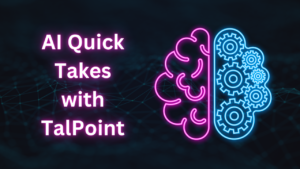
Your weekly source for news and updates on all things AI.
Looking for more regular updates from TalPoint? Follow us on Linkedin, Twitter, or visit us at TalPoint.com.
Read time: under 4 minutes
AI Spotlight
OpenAI’s New Search Engine: A Rival to Google?

OpenAI is supposedly working on a new search engine that will be integrated into ChatGPT, enhancing its ability to answer your questions. Here’s what we’ve heard so far:
- Directly in ChatGPT: The search feature will live within ChatGPT, so you can ask your questions and receive answers right there.
- Trusted Sources and Multimedia Answers: Answers will come directly from reliable internet content like Wikipedia and blog posts, and will be properly cited. Some answers will include both text and images. For instance, if you ask “how to change a doorknob,” you might get a helpful diagram too.
- A Google Competitor: The new search engine could become a serious rival to Google, according to Bloomberg.
The first hints surfaced in February, when The Information reported that OpenAI was developing a search app aimed at Google’s core competency. If true, this would mark a significant departure from the company’s current arrangement with Microsoft, which uses Bing to provide ChatGPT with web access. Bing uses retrieval-augmented generation (RAG) to enhance answers by incorporating web search data into GPT-4 chatbot responses, providing up-to-date information.
A Twitter member noted that OpenAI had been busy with a new subdomain named search.chatgpt.com. “OpenAI’s recent SSL certificate logs revealed something interesting: the domain (search-dot-chatgpt-dot-com) may indicate that OpenAI is developing a search functionality,” he said.
Until the explosive debut of consumer-ready AI tools like ChatGPT, Google was the undisputed king of search. However, its central position is being challenged as users become more comfortable asking a chatbot for answers rather than conducting a Google search. For some, this shift can’t come soon enough, as Google’s search results are increasingly crowded with paid placements and websites created solely to draw search traffic.

In a recent podcast with Lex Fridman, OpenAI’s chief, Sam Altman, hinted at the company’s interest in reinventing web search. “The intersection of LLMs plus search, I don’t think anyone has cracked the code on yet,” he said. “I would love to go do that. I think that would be cool.”
As of now, there has been no official announcement from OpenAI regarding the development of a search engine, and OpenAI did not immediately respond to a request for comments from Decrypt. However, given the founders’ enthusiasm for this space, a new AI search engine seems more likely than not.
Trending AI Technologies
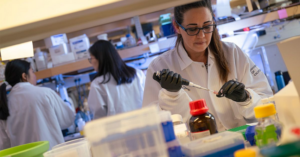
Revolutionizing Drug Discovery with AI
Scientists at UC San Diego have developed an innovative machine learning algorithm, POLYGON, that simulates the early-stage chemistry of drug discovery. Traditionally requiring thousands of experiments, the AI platform significantly accelerates this process, identifying new drug candidates in a fraction of the time. Researchers successfully used the tool to synthesize 32 potential cancer drugs, demonstrating its ability to streamline pharmaceutical development.
POLYGON’s Unique Multi-Target Approach
POLYGON stands out among AI tools because it identifies molecules targeting multiple proteins, unlike existing single-target drug discovery protocols. The platform uses a vast database of over a million bioactive molecules to predict the properties of new compounds and generate original chemical formulas. This multi-target approach could usher in a new era of precision medicine, enabling more effective cancer treatments with fewer side effects.
The Future of AI in Drug Discovery
POLYGON’s success highlights a growing trend of using AI in pharmaceutical science. Once met with skepticism, AI is now considered essential, with startups prioritizing its integration into business plans. Although human expertise remains crucial, AI promises to streamline the drug discovery process. The development team, led by Professor Trey Ideker, is optimistic that AI’s potential in this field is just beginning to be realized, paving the way for groundbreaking advancements in both academic and private sectors.
AI Data Point
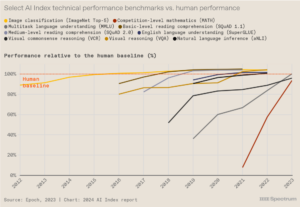
AI systems have surpassed some human abilities in tasks like reading comprehension and visual reasoning. Nestor Maslej, editor-in-chief of the 2024 AI Index Report, published by the Stanford Institute for Human-Centered Artificial Intelligence (HAI), notes that the pace of AI improvement has accelerated. “A decade ago, benchmarks like ImageNet posed a challenge to AI researchers for five or six years,” he explains. “Now, a new benchmark for competition-level mathematics starts with AI at 30 percent accuracy, and within a year, it climbs to 90 percent.” Although humans still excel in some complex cognitive tasks, let’s revisit this next year to see how things evolve.
Company Watch
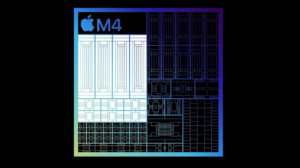
Apple has introduced its latest iPad Pro lineup, featuring 11- and 13-inch models powered by the groundbreaking M4 processors. This is the first major change to the iPad lineup since October 2022, and here’s what stands out:
The new M4 chip is designed from the ground up to work with AI, making it a game-changer for the iPad Pro. According to The Verge, there’s at least one PC chip more powerful than the M4 but Apple’s new chip delivers similar performance while using just a quarter of the power. The M4 also promises significant improvements in machine learning, handling AI-based tasks more efficiently than ever before. It supports the new Tandem OLED technology, delivering stunning visuals on the Ultra Retina XDR displays while enhancing battery life.
Meanwhile, The Wall Street Journal reported that Apple is developing a custom chip to run AI software in data centers, a first for the company. While Apple already builds chips for its phones and computers, this would be the first capable of analyzing data on servers. Expect more details on Apple’s AI advancements and data center chip at WWDC in June.
Practical AI
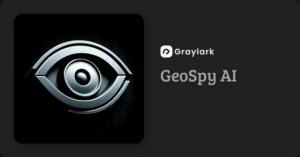
GeoSpy: Have you ever wondered where a location is just by looking at a picture? With GeoSpy, you can find out effortlessly. GeoSpy is a state-of-the-art AI platform specializing in geo-estimation and location prediction. It uses pixel data to accurately identify geographical locations.
———————————————————————————————————————————————————————————————————————————————————————————-
Thanks for reading. Until next weekend!
For questions and feedback, email us at marketing@talpoint.com. We would love to hear from you.




